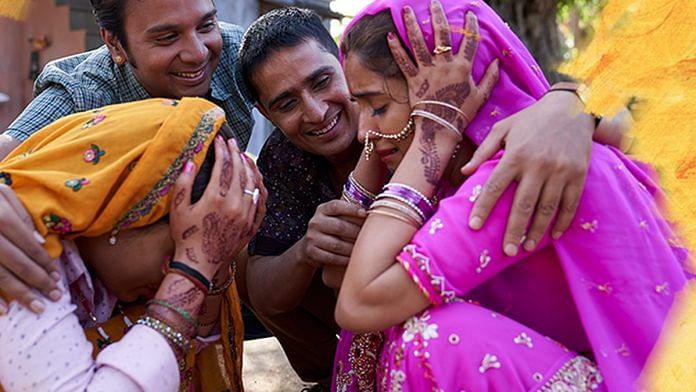Vishal Bhardwaj’s Pataakha, featuring Sanya Malhotra and Radhika Madan, packs a powerful punch.
Vishal Bhardwaj’s Pataakha is loud and subtle at the same time because, unlike its title, the movie gradually leads the viewer to an explosive climax with a thoughtful intention.
Bhardwaj manages to give us two complicated, and often unlikeable, female protagonists who fight fate and each other for a chance at their dreams. What he doesn’t give us is a strong enough motive for their sibling rivalry.
The movie is however a testament to the writer and director’s artistic capability because he is able to take Charan Singh Pathik’s six-page short story Do Behnein and create a two hour and 14 minutes of near-seamless, endearing cinema. There is little to hate about Pataakha.
Sanya Malhotra as Chutki Genda is easy to watch, managing to portray an effortless genuineness that is difficult to come by in Bollywood these days. Radhika Madan as Badki Champa, in her debut film, takes a while to warm up to her character, but perhaps that is intentional – of the two sisters, she is older and more guarded.
Also read: Remembering Yash Chopra, a filmmaker who was more than just the ‘King of Romance’
The plot revolves around the axis of their turbulent relationship, distancing itself only to establish their individual timelines, love stories, and career graphs before coming back towards the centre.
What makes Pataakha particularly interesting is that the men in the film, including Dipper (played by Sunil Grover) as the recurring jester, largely serve the purpose of plot devices – as catalysts or impediments to Champa and Genda’s story or as injections of emotion that flesh out the main characters. They are essential, but not central.
For a lot of women in India, the forces deciding their destiny are often as arbitrary as a flip of a coin – the strings are always in someone else’s hands.
In Pataakha, Bhardwaj takes the fickle coin toss and turns it on its head — things may happen to Champa and Genda, but they always find a way to reclaim their agency. Their determination to fulfil their dreams sometimes makes them selfish and short-sighted, but that dimension of hostility is what makes them human. Two flawed, fighting, abusive and selfish women, who will not sacrifice their life’s happiness even for their loving, but slightly helpless, father.
Bhardwaj uses the war between the two sisters to teach the audience a lesson – underneath all that hate is a human connection that’s lost in miscommunication. The parable, however, is weak. As a citizen of this world, everyone understands the futility of war that is seemingly without cause, but history can’t be condensed into hallmark cards. The allegory to India-Pakistan, Palestine-Israel is well-intentioned, but a tad simplistic. It will take a lot more than a father’s fake funeral and a heartfelt impassioned speech to bring world wars to an end.
Also read: Nandita Das’ Manto is a befitting reply to Sunny Deol’s Gadar-like jingoism
Bhardwaj’s use of psychosomatic blindness and a speech impediment that plagues Chutki and Badki respectively, and simultaneously, can also come across as melodramatic and unrealistic amid a hyper-realist rural setting.
The director took pains to give the actors stains on their teeth but also took the liberty to make them experience simultaneous meltdowns? I forgive Bhardwaj because anyone familiar with his cinema knows that the man loves his theatre – a sliver of magic realism is a welcome cameo in my book.
All in all, while Pataakha could have done well with a bit of editing – it drags for just a moment – it is thoroughly entertaining, passes the Bechdel test, and consists of wonderful performances by the whole cast. Yes, even the men do just fine in their supporting roles.



